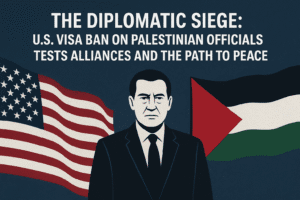The Diplomatic Siege: U.S. Visa Ban on Palestinian Officials Tests Alliances and the Path to Peace
In a significant diplomatic escalation, the U.S. revoked visas for Palestinian officials, aiming to block their attendance at the upcoming UN General Assembly. Washington condemned their pursuit of statehood recognition and appeals to international courts as actions undermining peace. This move starkly contrasts with Canada’s position, which called for dialogue and confirmed its intent to conditionally recognize a Palestinian state. The incident highlights a deep fracture among allies, pitting a U.S. strategy of isolation against a multilateral approach of engagement. This risks weakening moderate Palestinian leadership and the very prospects for a negotiated two-state solution. The upcoming UN meeting now becomes a high-stakes showdown between these competing visions for peace.

The Diplomatic Siege: U.S. Visa Ban on Palestinian Officials Tests Alliances and the Path to Peace
In a move that has sent shockwaves through international diplomacy, the Trump administration has effectively barred key Palestinian officials from entering the United States, revoking and denying their visas ahead of the critical United Nations General Assembly (UNGA) this September. This decision, targeting members of the Palestinian Authority (PA) and the Palestine Liberation Organization (PLO), has not only escalated tensions but also thrown a stark spotlight on the deepening fissures between Washington and its traditional allies, including Canada, who are pursuing a different path.
This isn’t just a bureaucratic dispute over travel documents; it’s a high-stakes geopolitical gambit that threatens to isolate the very partners essential for a lasting peace.
The U.S. Move: A “Accountability” Measure or a Diplomatic Blockade?
The U.S. State Department, under Secretary Marco Rubio, justified the visa ban by accusing the PA and PLO of undermining peace prospects. Their specific crimes, in Washington’s view, are twofold:
- Pursuing statehood recognition at the UN: Instead of negotiating bilaterally with Israel, the Palestinians are seeking legitimacy through a multilateral international body.
- Appealing to international courts: Efforts to have the International Criminal Court (ICC) and International Court of Justice (ICJ) investigate alleged Israeli crimes in Gaza are seen by the U.S. as “lawfare” that sabotages negotiations.
The U.S. argues these actions have “materially contributed” to Hamas’s refusal to release hostages and the breakdown of ceasefire talks—a claim that Palestinian officials and many international observers fiercely contest.
The reported inclusion of PA President Mahmoud Abbas on the visa blacklist is particularly symbolic. It represents a personal snub to the leader Washington has, for decades, considered the primary negotiating partner for peace with Israel. By potentially preventing him from addressing the UN in New York, the U.S. is challenging the very spirit of the UN’s headquarters agreement, which obligates host countries to allow access for diplomats.
The Canadian Response: A Delicate Call for Dialogue
In stark contrast to the U.S.’s confrontational approach, Canada’s response has been measured, emphasizing diplomacy. A Global Affairs Canada spokesperson called for “dialogue and diplomacy involving both Israel and the PA,” explicitly stating that such engagement at forums like the UNGA is “essential” for advancing a two-state solution.
This is more than just polite disagreement. Canada, along with Britain, Australia, and France, has signaled its intention to formally recognize a Palestinian state during the UN meeting—a move directly at odds with the U.S. strategy. However, Canada’s position is notably nuanced. Its recognition is conditional on the Palestinian Authority undertaking significant reforms and holding new elections, positioning itself as a legitimate, peaceful alternative to Hamas.
This conditional support reflects a pragmatic, middle-ground approach: affirming the right of Palestinians to statehood while demanding accountability and good governance from their leadership. It’s a stance that seeks to empower moderates rather than isolate them.
The Deeper Conflict: Two Visions for Peace
This diplomatic clash reveals two fundamentally opposing theories for achieving peace:
- The U.S. and Israeli (Netanyahu government) view: Peace must be achieved through direct, bilateral negotiations where Israel holds significant leverage. Any external pressure, whether from the UN or international courts, is seen as illegitimate interference that rewards Palestinian “unilateralism.”
- The growing multilateral view (Canada, EU members, etc.): After decades of stagnant bilateral talks and expanding Israeli settlements, the two-state solution is on life support. International recognition and involvement are not spoilers but essential tools to preserve the possibility of a negotiated peace, bolster moderate Palestinian leaders, and provide a political horizon beyond the current cycle of violence.
The risk of the U.S. approach is that by isolating and punishing the PA—the entity that recognizes Israel and has security coordination with it—Washington may be weakening the only viable alternative to Hamas, ultimately empowering the very extremists it seeks to counter.
The Human Element: A Test of Legitimacy
For President Abbas, this is a critical test. If he cannot represent his people on the world’s largest diplomatic stage, his legitimacy and that of the PA he leads suffers a very public blow. The U.S. move plays into a potent Hamas narrative that diplomacy and moderation are futile. Canada’s conditional offer of recognition, meanwhile, offers a potential reward for that same moderation, but it demands difficult internal changes.
The coming weeks at the UN will be a dramatic tableau of these competing visions. As world leaders gather in New York, the empty chair of the Palestinian president—should he be blocked—will speak as loudly as any fiery speech. The question remains: will isolating the Palestinians bring them to the table on someone else’s terms, or will it simply burn the table down altogether? Canada and its allies are betting on a different, more inclusive strategy, hoping that engagement, not exile, is the key to a future where Israelis and Palestinians can live side-by-side in peace and security.
You must be logged in to post a comment.